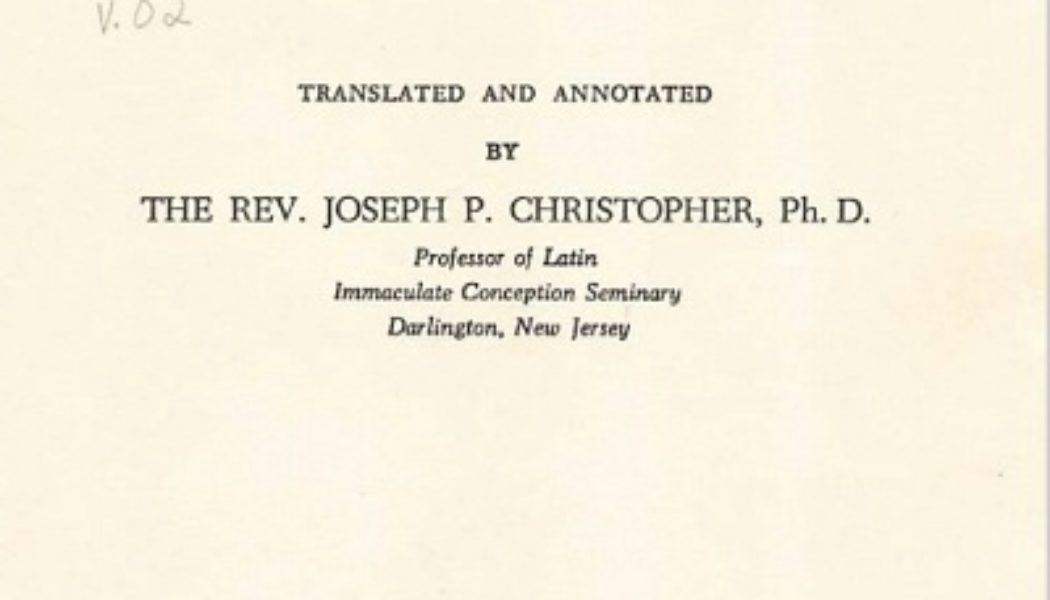I honor of Catholic Schools Week, which I guess is next week? Or was it this week? This is, joyfully, not my problem anymore, so I don’t keep track.
Anyway, in honor of it, whenever it is, some thoughts from St. Augustine, specifically his First Catechetical Instruction.

I have a couple of print editions of the work, but of course it’s easily available on line.
(Although that translation is older and less understandable than newer versions.)
The genesis of the work is simple and pastoral. A deacon wrote to Augustine seeking help on catechesis – specifically, the stage of catechesis offered to potential catechumens. That is, if you assented to everything you were taught in this stage, you would then be admitted to the catechumenate. The deacon has apparently confessed that he needs little shot in the arm. He wants to make sure that he’s teaching the right material and, frankly, he’s getting a little bored.
At the same time, you have made the confession and complaint that it has often befallen you that in the course of a lengthened and languid address you have become profitless and distasteful even to yourself, not to speak of the learner whom you have been endeavoring to instruct by your utterance, and the other parties who have been present as hearers…..
As per usual, I’m most interested in the framework here. I’m interested in what the work reveals about church life in 4th century North Africa, about expectations and assumptions and complexity. What interested me the most:
- The work is divided into two parts: theory and practice. Augustine answers questions about the pedagogical issues the deacon has raised, and then he gives him a sample catechesis.
- Augustine recognizes that people bring varying levels of learning to the moment and reminds the deacon to constantly tailor his words to the listener’s capabilities.
- He constantly reminds the deacon to be sensitive to his listeners’ situations – if they’re tired, let them sit! Don’t make them stand!
- There is nothing elaborate about this stage of formation: the catechist straight-up teaches the material – which is basically the story of salvation history pointing to and culminating in Christ – and the listeners say, “Yup. I believe it.” And then they move on.
- Augustine takes time to describe the mixed bag the potential Christian will encounter when he observes the Church. He will see saints, but he will also see a lot of sinners and even heretics. He speaks of the challenge the catechist has to keep pointing to Christ from the midst of this mixture of grain and chaff. That’s in 25, and it’s worth quoting because, again, it still applies. Dealing with the existence of sin in the Church, among its members (us) and leaders is one of the most challenging aspects of this whole business. Here’s what Augustine says:
At the same time, not even on those same good men, who either anticipate you or accompany you on the way to God, ought you to set your hope, seeing that no more ought you to place it on yourself, however great may be the progress you have made, but on Him who justifies both them and you, and thus makes you what you are. For you are secure in God, because He changes not; but in man no one prudently counts himself secure. But if we ought to love those who are not righteous as yet, with the view that they may be so, how much more warmly ought those to be loved who already are righteous? At the same time, it is one thing to love man, and another thing to set one’s hope in man; and the difference is so great, that God enjoins the one and forbids the other.
Take that notion, put it in your pocket, and keep it safe. Love people but don’t set your hope on them.
- I want to quote at length from the passage in which Augustine advises the deacon on what to do to keep his own spirits and interest up. I just find the consistency of human experience fascinating – here we have a man writing ONE THOUSAND SEVEN HUNDRED YEARS AGO to another fellow who’s getting a little bored repeating the same lessons over and over and who’s unsure whether or not he’s being heard and really understood.
I’ve also always thought that when it comes to messing about with Church teaching and practice – including music and liturgy – boredom plays a generally unseen role.
Is there a teacher out there who doesn’t share that concern? A teacher of any sort? Anyone who has to work with other people, period? Augustine breaks these problems down into several components:
- Our words are inadequate to the truths we’re trying to express. When it’s in our head, it’s wonderful and luminous, but the minute we try to speak, we become keenly aware of the limitations of language, and it’s discouraging.
- We get bored.
- Our listeners seem apathetic.
- We’re irritated that we’ve been called to go catechize while we’re doing something else.
Once more, however, we often feel it very wearisome to go over repeatedly matters which are thoroughly familiar, and adapted (rather) to children. If this is the case with us, then we should endeavor to meet them with a brother’s, a father’s, and a mother’s love; and, if we are once united with them thus in heart, to us no less than to them will these things seem new. … Is it not a common occurrence with us, that when we show to persons, who have never seen them, certain spacious and beautiful tracts, either in cities or in fields, which we have been in the habit of passing by without any sense of pleasure, simply because we have become so accustomed to the sight of them, we find our own enjoyment renewed in their enjoyment of the novelty of the scene? And this is so much the more our experience in proportion to the intimacy of our friendship with them; because, just as we are in them in virtue of the bond of love, in the same degree do things become new to us which previously were old.
[That is – be open to the possibility that sharing what you’ve heard and taught a million times before with someone to whom it is all new – might just renew your spirit.]
…. And how ought we to feel ourselves renewed in their newness (of experience), so that if our ordinary preaching is somewhat frigid, it may rise to fresh warmth under (the stimulus of) their extraordinary hearing! There is also this additional consideration to help us in the attainment of gladness, namely, that we ponder and bear in mind out of what death of error the man is passing over into the life of faith. And if we walk through streets which are most familiar to us, with a beneficent cheerfulness, when we happen to be pointing out the way to some individual who had been in distress in consequence of missing his direction, how much more should be the alacrity of spirit, and how much greater the joy with which, in the matter of saving doctrine, we ought to traverse again and again even those tracks which, so far as we are ourselves concerned, there is no need to open up any more; seeing that we are leading a miserable soul, and one worn out with the devious courses of this world, through the paths of peace, at the command of Him who made that peace good to us!
****Nevertheless, supposing that we have once begun in that manner, we ought at least, whenever we observe signs of weariness on the part of the hearer, to offer him the liberty of being seated; nay more, we should urge him by all means to sit down, and we ought to drop some remark calculated at once to refresh him and to banish from his mind any anxiety which may have chanced to break in upon him and draw off his attention. For inasmuch as the reasons why he remains silent and declines to listen cannot be certainly known to us, now that he is seated we may speak to some extent against the incidence of thoughts about worldly affairs, delivering ourselves either in the cheerful spirit to which I have already adverted, or in a serious vein; so that, if these are the particular anxieties which have occupied his mind, they may be made to give way as if indicted by name: while, on the other hand, supposing them not to be the special causes (of the loss of interest), and supposing him to be simply worn out with listening, his attention will be relieved of the pressure of weariness when we address to him some unexpected and extraordinary strain of remark on these subjects, in the mode of which I have spoken, as if they were the particular anxieties,— for indeed we are simply ignorant (of the true causes). But let the remark thus made be short, especially considering that it is thrown in out of order, lest the very medicine even increase the malady of weariness which we desire to relieve; and, at the same time, we should go on rapidly with what remains, and promise and present the prospect of a conclusion nearer than was looked for.
What I appreciate is the typical Augustine frankness and compassion. He is honest about human beings – about the catechist, about the listeners. But he never fails to remind the deacon that love is at the center of all that he does. The medicine may be different, he says, but the love is the same. There is no condemnation, no finger-pointing, no easy categorization, not even any sense of “them” – simply a call to let God work through us, to share the Good News despite ourselves and our weakness, in love.









